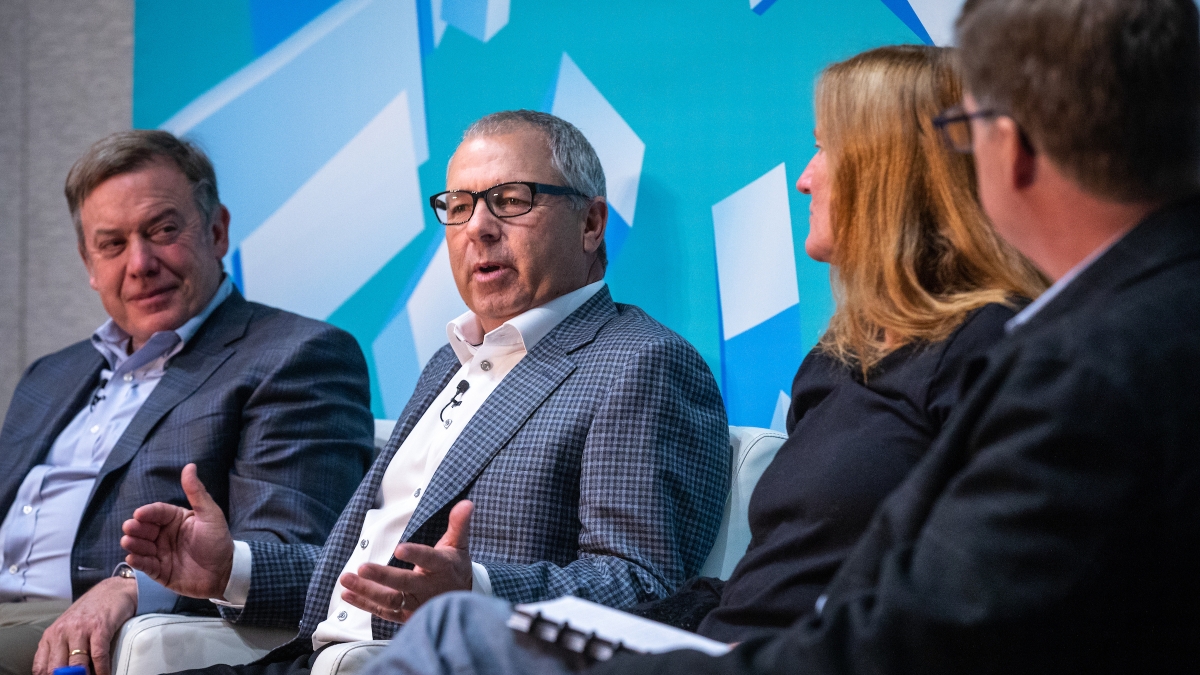Editor's note: Read more of the highlights from the ASU + GSV Summit on our blog.
Sports and learning go hand in hand — or at least they should, according to several experts who spoke on a panel about athletics at the ASU + GSV Summit in San Diego on Wednesday.
Engaging in sports can teach a person about themselves and many lessons that last a lifetime, according to Michael Crow, president of Arizona State University, who was a wrestler and javelin thrower while a student at Iowa State.
“I learned the principle of working in an environment that was fair,” he said. “I was a guy who could win a couple of points for the team. You learn all of that was worth it even if you weren’t an NCAA champion or go to the Olympic trials.
“You were learning from people who were outperforming you. You could understand how to blend your life with all these other things, master the relationship between your body and your mind.”
And overcome fear.
“As a high school wrestler, in my senior year I weighed 220 pounds and wrestled people who weighed 350 pounds and were 6 foot 8. You have to figure out how to overcome the urge to flee,” Crow said.
Karen Crouse, a sportswriter for the New York Times, worries that overeager parents are trying too hard to specialize their children rather than letting them have fun. She is the author of the new book, “Norwich: One Tiny Vermont Town’s Secrets to Happiness and Excellence.”
“I was drawn to this town because here is a town of 3,000 people that has put 11 of its own on Olympic teams — but not in a sports-factory type of way,” she said.
“They look at sports as a way of instilling in their children life lessons and intrinsic benefits that will carry over into their adult lives — resilience, persistence, delayed gratification, teamwork, being coachable.”
Crow said that ASU tries to provide as many athletic opportunities as possible for its students — at every level.
“We have hundreds of intramural programs involving tens of thousands of students. We have recreation leagues engaging thousands of students. We have over 50 club sports, and we wish we had more. We have rodeo and waterskiing,” he said.
“We have 24 varsity sports competing at the highest level, many at the Olympic level.”
Crow said that sports is an important part of American culture, but pressure from professional leagues is causing problems.
“This corruption going on around sports has been pro sports seeking athletes at the earliest possible age and funneling them through college — this ‘one-and-done' scam,” he said.
“College athletes should be college athletes. We should have agreements like we have with professional baseball that you can’t recruit athletes before their third year of college, and even then they should be allowed to finish,” he said.
Mark King, the president of adidas for North America, said he’s not sure he would have gone to college if he hadn’t gotten a golf scholarship.
“I think athletics gives people a chance to have a better life,” he said.
“We found out that 90 percent of the world’s professional athletes come from poverty. Sport has given them a chance to break out of poverty and do something meaningful for their communities.”
ASU and adidas have formed a partnership that has led to the Global Sport Institute and other initiatives.
“We have projects going on with ASU and other partners where we’re in search of the ‘perfect athlete,’” he said.
“We’re looking at an athlete’s mind, their capacity for oxygen, all the things that go into making an athlete.
"The outcome isn’t a new pair of shoes — it’s, 'How do you make the world a better place?'”
Top photo: Mark King, president of adidas North America, speaks during a panel discussion on "Field(s) of Dreams, If We Build It, Will They Come? Using Athletics as a Research Lab Featuring adidas," at the ASU + GSV Summit 2018 in San Diego on April 18, 2018. King was joined by ASU President Michael Crow; sportswriter Karen Crouse with the New York Times; and moderator Andrés Martinez, a Cronkite professor of practice.
More Arts, humanities and education

ASU instructor’s debut novel becomes a bestseller on Amazon
Desiree Prieto Groft’s newly released novel "Girl, Unemployed" focuses on women and work — a subject close to Groft’s heart.“I have always been obsessed with women and jobs,” said Groft, a writing…

‘It all started at ASU’: Football player, theater alum makes the big screen
For filmmaker Ben Fritz, everything is about connection, relationships and overcoming expectations. “It’s about seeing people beyond how they see themselves,” he said. “When you create a space…

Lost languages mean lost cultures
By Alyssa Arns and Kristen LaRue-SandlerWhat if your language disappeared?Over the span of human existence, civilizations have come and gone. For many, the absence of written records means we know…


